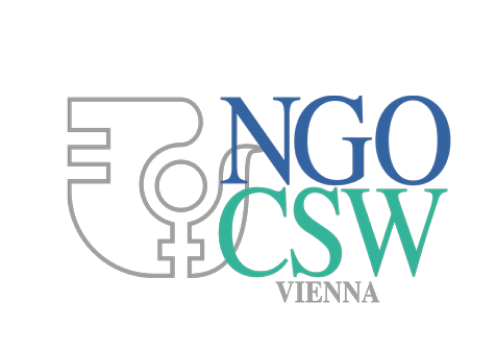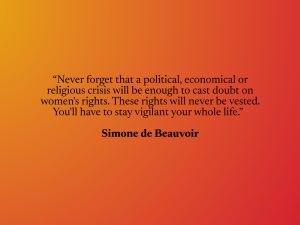Staying Vigilant, Making a Better World for All
“Never forget that a political, economical or religious crisis will be enough to cast doubt on women’s rights. These rights will never be vested. You’ll have to stay vigilant your whole life.” Simone de Beauvoir
The Vienna Declaration and Programme of Action adopted at the 1993 World Conference on Human Rights affirmed that “the human rights of women and of the girl-child are an inalienable, integral and indivisible part of universal human rights. The full and equal participation of women in political, civil, economic, social and cultural life, at the national, regional and international levels, and the eradication of all forms of discrimination on grounds of sex are priority objectives of the international community.“
In 1995, the 4th World Conference on Women in Beijing was enthusiastic, optimistic, forward-looking. Twenty-five years later, women’s rights are under attack; there has been a significant push backwards since Beijing+20. Though there have been some successes, we must fight against retreats from the gains achieved since Vienna and Beijing. The human rights of women and girls recognized in international law are irreversible. United Nations Member States must ensure the full provision of economic, social and cultural rights to all women and girls everywhere.
The NGO Committee on the Status of Women Vienna works with UN agencies based in Vienna to support their work on gender equality, women’s empowerment, peace and justice. We reaffirm the Vienna and Beijing Declarations, the Convention on the Elimination of All Forms of Discrimination against Women and all relevant existing conventions and treaties, which are the legal framework for realizing gender equality, the empowerment of women and girls in all their diversity, and their equal enjoyment of all human rights.
Twenty-five years after the adoption of the Beijing Declaration and 40 years after the adoption of the Convention on the Elimination of all Forms of Discrimination Against Women, too few of the agreed standards have been achieved. There is a gap between multilateral commitments and follow-up implementation to translate them into policies that benefit women and girls. New challenges not foreseen in 1995 have emerged, and must be tackled.
The full and equal participation of all women across the life cycle is essential for achieving the 2030 Agenda for Sustainable Development and its goal to improve the lives of all people, preserve the planet, and create more peaceful, just and inclusive societies. Some indicators of gender equality have improved, but insufficient progress on structural issues at the root of gender inequality undermines our ability to achieve SDG 5. Currently, no country in the world is on target to achieve gender equality by 2030.
Gender equality continues to be threatened. Patriarchy, misogyny, unequal power relations, traditional social and cultural norms, gender stereotypes, and the unequal burden of unpaid work strip women of their dignity, deprive them of their human rights, and erode their well-being. Too many women are living in poverty, with limited access to financial and other resources. They are held back from full and equal participation by reduced access to justice, health services and education; gender-based violence; and discriminatory laws and policies. Women bear disproportionate impacts of violent conflict and environmental degradation.
Violence against women and girls including structural violence is a violation of fundamental human rights. We condemn all forms of gender-based violence, discrimination and harassment in public and private spheres, educational settings and the workplace; child, early and forced marriage; female genital mutilation; and modern day slavery.
Equal access to inclusive, quality free education is vital to achieve gender equality; it is the fundamental tool to empower women and girls to participate in decision-making. All girls and women deserve safe learning environments at all educational levels, that are free from violence, harassment and discrimination. Cultural and traditional practices should not limit girls’ and women’s rights to quality education. Human rights and gender equality education in school curricula will create an intentional shift to a culture of peace, inclusion, equity, justice, mutual respect, non-violence, and peaceful dispute resolution in schools, families and communities.
Universal, comprehensive health services must be free, accessible, gender-sensitive and address women and girls’ specific needs in all fields of medicine, including mental health and sexual and reproductive health services.
Conflict, climate change, migration, corruption, inequality and poverty are some of the most serious challenges facing our world today, requiring coordinated multilateral responses.
United Nations Member States must commit to end armed conflicts and begin peace processes involving all stakeholders according to Security Council Resolution 1325 and the Women, Peace and Security agenda; include women in conflict prevention and peacemaking, decision-making and development of post-conflict programs and initiatives; ensure that sexual and other forms of gender-based violence are never used as weapons of war, and that women and girls in conflict-affected areas are fully protected.
To mitigate the impending climate crisis, we must integrate women’s experience and knowledge into the protection of our planet, and include gender perspectives in designing effective responses to climate change, as well as environmental and disaster risk reduction policies. Women play a critical role in managing water, sources for fuel, and food, as well as forests and agricultural land in communities around the world. Giving women access to the resources they need would enhance food security and nutrition and strengthen families and communities.
Over 70 million people around the world are displaced or forced to migrate due to armed conflict, persecution, human rights violations, and environmental degradation; the majority are women and children, vulnerable to violence, exploitation and trafficking. Their needs must be met, or we risk endangering future generations.
Harnessing the benefits of information technology and innovation requires creative solutions and financial investment to include communities with limited or no access to computer technology and internet connectivity. All girls and women must have access to education in science, technology, engineering and math. Advancements in information technology have brought positive solutions, however, we face adverse effects like the need for protection and privacy, that requires legislation and law enforcement to prevent cyber crime. Media can be a powerful force for promoting positive role models and behaviors, and eliminating gender stereotypes.
Our Vision for the Future: Changing Our World for the Benefit of All. Gender equality is the basis for sustainable economic and social development and will unlock humanity’s full potential to create more prosperous and peaceful societies for all, women and men, girls and boys.
Reallocation of funding from war to peace, reducing military spending and increasing public expenditure on education, health and social services will contribute to a better, more peaceful and just world.
More women at all levels of political and economic decision-making will lead to more effective outcomes, better governance and greater commitment to common goals.
To achieve a future beneficial for all we need to preserve our planet. Governments must promote women-led initiatives addressing energy, water and sanitation, transportation, land planning, waste management and infrastructure. Meeting these needs will require more inclusive, democratic forms of participation, including women and men as full contributors to decisions which affect their daily lives.
Our vision advocates for alternative, inclusive global financial and economic systems that reduce inequalities, distribute resources more equitably, create decent work with decent pay for all, and value the contribution of unpaid work to the global economy.
Women’s organizations will continue to be vigilant. We will hold Governments accountable for closing the implementation gap and finally achieving the goals of the Beijing Platform for Action. We will build on the strength of the women who have come before us, with the hope of sustaining our work for a better world for future generations.
Signed by the following organizations:
African Action on AIDS
African Women’s Organization
European Union of Women
Federation of American Women’s Clubs Overseas (FAWCO)
Graduate Women International
International Alliance of Women
International Association of Democratic Lawyers
International Council of Jewish Women
International Council of Women
International Federation of Business and Professional Women
International Federation for Home Economics
International Inner Wheel
Le Projet Imagine
Pax Romana
Servas International
Socialist International Women
Soroptimist International
Verband feministischer Wissenschafterinnen Österreichs
Verein zur Förderung der Völkerverständigung
Women In Development Europe (WIDE)
Women’s Federation for World Peace International
Women’s International Zionist Organization
World Union for Progressive Judaism
Zonta International






